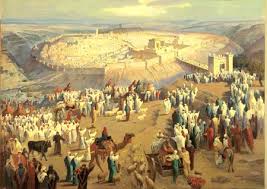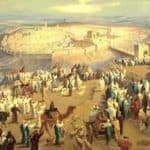We read in the beginning of the Torah Portion of Ki Tavo the following;
“And it will be, when you come into the land which Hashem, your G-d, gives you for an inheritance, and you possess it and settle in it, that you shall take of the first of all the fruit of the ground, which you will bring from your land, which Hashem, your G-d, is giving you. And you shall put [them] into a basket and go to the place which Hashem, your G-d, will choose to have His Name dwell there.” (Deuteronomy 26:1-2)
The first words speak a simple truth;
“And it will be, when you come into the land which Hashem, your G-d, gives you for an inheritance, and you possess it and settle in it” A simple but an eternal truth . Whenever you come in the land of your inheritance you will need to settle it in order for it to begin to overflow with blessings.
Yet the bringing of those first fruits becomes more than a powerful image.
The ancient text called the Sifri declared that ” The Creation of the world occurred in the merit of the commandment of Bikkurim-First fruits.” That statement is so powerful in its simplicity that it demands to be explored.
After a year of toiling, planting, watering, tending, and caring for the produce man has grown, he enters his field. He sees the first ripening fruit of one of the seven species” “A land of wheat and barley, vines and figs and pomegranates, a land of oil-producing olives and honey[-producing dates) “Deuteronomy 8:8) .”: The farmer ties a band over this fruit and declares “This is for Bikkurim (the ceremony of first fruits)” Later, when it ripens, he places it in a basket.
These baskets were then brought to the Beit HaMikdash in a festive procession. In all parts of Israel they would gather in the middle of their towns in special gatherings called Maamadot. They awoke after spending the night in the open are when an appointed individual announced “Arise and let us go up to Zion and the house of our L-rd.” The groups would then in a festive procession to Jerusalem singing, “I was happy when they said to me let us go to the house of Hashem” (Psalms Ch 122).
The procession included a bull to be used as a thanksgiving sacrifice, adorned with gold and a wreath of olive branches, with the whole procession led by the music of flutes. As they stood within the temple, the one offering the Bikkurim states to the priest in the Temple,”I proclaim this day to Hashem thy G-d that I have come unto the land which Hashem swore unto our fathers to give them.” The person then declares the Vidui recanting the travails of the Israelites till they arrived in the land, settled it and now have succeeded in gathered in its fruits.
As the procession would walk through the streets of Jerusalem, all the workmen , laborers and scholars would stop what they are doing and stand in honor of these farmers bearing Bikkurim. The Torah commentator Bartenura raises an interesting question. According to another Jewish law, It is obligatory to stand in honor of a Torah scholar when he passes This is done not so much to honor the scholar as it is to honor the Torah that this ” living Torah scroll “represents.
Yet that Jewish law continues that craftsmen do not have to stop their work to stand up for such a scholar as this would interrupt their work and livelihood. Such is not the case with the law regarding these farmers bringing the first fruits. Everyone including the High Priest and the King would welcome them. “Why”, asks the Bartenura, is that so?
The reason seems to be that these farmers, in this situation, during these festive times themselves act as high priests. They are the tools of G-d’s revelation within nature. This would be true anywhere in the world. Yet this is especially true in the land wherein Heaven touches the earth. In such a place the very fruits carry a Divine message.
The return of G-d’s Glory, symbolized by the fruits and blossoms of the land. Ezekiel describes the return of the people from Exile in the following way; “But you, O mountains of Israel, will produce branches and fruit for my people Israel, for they will soon come home.”(ibid 36:8 ) .
Every fruit, every tree, every flower is a testament to G-d’s promises. That then becomes the role of these simple farmers. They are the vessels through which G-d’s Presence is revealed and glorified. That as the Sifri pointed out is in essence is the purpose of creation.” Hashem G-d took the man and put him in the Garden of Eden to work it and take care of it. “( Genesis 2:15).
The purpose of creation is to bring humanity to an awareness of their partnership in Hashem’s plan. After the time effort and care exercised by every farmer in the tending of the garden, the farmer’s bringing the first fruits to Hashem is a powerful sanctification of Hashem’s name in reality.
That would be an important thing to remember as we eat of the fruits at the Rosh Hashanah festival table.
Gratitude, acknowledgement and sanctification ensconced in each fruit
LeRefuat Yehudit bat Golda Yocheved

